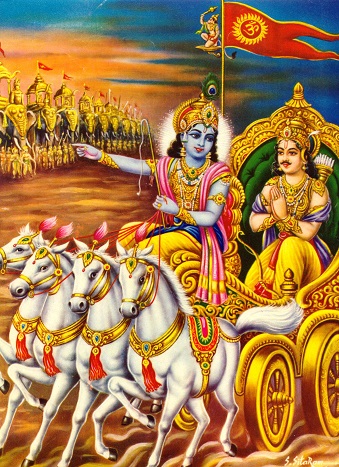Contribute
| Annual BhagavadgÄ«tÄ Reading At SriLakshmi Temple |
Pradeep Vasudevan
08/25/2017
Annual BhagavadgÄ«tÄ Reading at SriLakshmi Temple A formal complete reading of S’rÄ«madbhagavadgÄ«tÄ at Srilakshmi Temple was initiated on SriKrishna Janamashtami in 1994. The event has continued annually with the support of the Temple administration and the devotees. This year’s event took place on Sunday, August 13. About a dozen people participated through the three-hour completion of the eighteen chapters of the text. Priest Mukunda of the Temple officiated and did the worship service. A beautifully decorated deity of Sri Krishna graced the reading. With the melody of the text and the ambience of the temple, the event became a devotional and spiritual exercise celebrating the grandeur of the message. The BhagavadgÄ«tÄ books were donated to the Temple by late Smt. Sarla Dayal, who passed away earlier this year at the age of 94. The devotees offered meditative prayer to many others who have left the earth or were unable to join. The books were worshipped at the beginning and then at the end. Sri V Ramapriya of Chinmaya Mission and Dr Bijoy Misra of SriLkashmi Temple led the chanting with support from Janmejay Shishupal, Pradeep Vasudevan, Prabhulal Rathi and others. The devotees were led to group prayers and were treated to Temple prasada. Dr. Bijoy Misra guided the chanting with instructions on the meter and melody. Melody is a function of poetic interpretation and is achieved through the full concentration on the letters. Expressing the strength of each letter helps create inner absorption that lets the reader enter the text deeper. With GÄ«tÄ’s beautiful composition, it is an excellent tool to meditate through chanting. We all experienced the effect of the melody in words. We enjoyed the reading. Daily BhagavadgÄ«tÄ chanting to enrich our lives S’rÄ«madbhagavadgÄ«tÄ is a part of the epic MahÄbhÄrata. MahÄbhÄrata was composed by Sage Vyasadeva. S’rÄ«madbhagavadgÄ«tÄ is part of the BhÄ«á¹£ma parva of the text. The epic MahÄbhÄrata comprises of approximtely a hundred thousand Å›lokas, out of which about seven hundred Å›lokas belong in S’rÄ«madbhagavadgÄ«tÄ. We surmise that sage Vyasadeva is also a form of Lord himself. As a Å›loka in viṣṇusahasranÄma would say: vyÄsÄya viṣṇurÅ«pÄya vyÄsarÅ«pÄya viṣṇave. We offer our prayers in dhyÄna shloka of BhagavadgÄ«tÄ to the Sage Vyasadeva and ultimately to the Supreme Being through him. Lord Shri Krishna’s first words in the GÄ«tÄ starts in 2nd chapter in which Lord Shri Krishna tried to convey the philosophical message of entire scriptures in a gist. Eighteen verses of 2nd chapter (verse 11 onwards), Shri Krishna clarifies the basic principles of creation and beyond. In the same chapter, through the last eighteen versus Lord Shri Krishna sets the goal for each one of us by describing the sthitaprajña state. May we all reach that state by the grace of Supreme Almighty. Lord Shri Krishna continues to talk about karmayoga(yoga of action) and jñÄnayoga(yoga of knowledge) in detail in next several chapters. Even though paths of karma and jñÄna are great, yoga is incomplete without bhakti “devotion.†Our functioning of life has a definition in Patanjali Yoga Sutra: tapaḥsvÄdhyÄye Ä«Å›varapraṇidhÄnÄni kriyÄyogaḥ. Tapah speaking about path of karma, svÄdhyÄya speaking of path of knowledge and Ä«Å›varapraṇidhÄna speaking about path of devotion. An integration of karma, jñÄna and bhakti is actual functioning of each one of our lives. BhagavadgÄ«tÄ is a not just scripture, but truly God in the form of words. I am reminded of a story I heard and which happened in the city of Puri, Odisha in India. There was a poor person but an ardent devotee of Lord Jagannatha. He chanted the entire gÄ«tÄ every day. His wife was an equally good person. Because of poverty they were not able to feed their children. The wife one day was upset. She snatched away the GÄ«tÄ book from her husband. In anger, she tore up pages with a knife. Her husband understood her situation, calmed her down and went out to beg food. When he was out, two boys - one with fair complexion and another with dark complexion came to his home. They handed over bags of vegetables and groceries. They told the wife that “that your husband got this and he asked us to drop them at your place.†She asked the boys to come in and have some water. Fair complexioned boy said that his friend with dark complexion cannot take anything as his tongue is deeply cut and hurt. She saw his tongue and she sympathized. She wished them well. After sometime, her husband returned tired. He said of his lack of success in his efforts. His wife responded that he should not worry since he had already sent groceries with those boys. The husband inquired about those boys and learned of the events. He figured out that the boys were none other than Lord Jagannatha and his brother Lord Balabhadra. Darker complexion boy was having the hurt tongue due to the torn pages in the BhagavadgÄ«tÄ. Even when we touch the holy GÄ«tÄ, we have to maintain the attitude of touching the Lord himself! Because of its purity and the pristine analysis, the GÄ«ta book is considered as Mother by the Hindu people. If we chant everyday as per our capacity, the Mother reveals herself to us. It is not an attitude of “I will find her and understand herâ€; it is the Lord who reveals Himself with the knowledge. In turn we can become good persons in all aspects. The GÄ«ta indeed has everything in it. Instructions on the life style, behavior, food and sleep habits or life after death - it contains all. Each time we read the GÄ«ta, we do understand a little more. Lord is infinite, knowledge is infinite, Lord manifesting in form of Mother GÄ«ta is infinite. Lord Shri Krishna himself says in the GÄ«tamÄhÄtmya: gÄ«tÄÅ›raye ahaá¹ tiá¹£á¹hÄmi gÄ«tÄ me cottamamagá¹›ham; gÄ«tÄñjanamupÄÅ›ritya trÄ«n lokÄn pÄlayÄmyaham – “My home in the GÄ«tÄ, I am well settled in it. I take care of the universe by following the instructions in the GÄ«tÄ!†Let Mother Srilakshmi bless all.
You may also access this article through our web-site http://www.lokvani.com/

